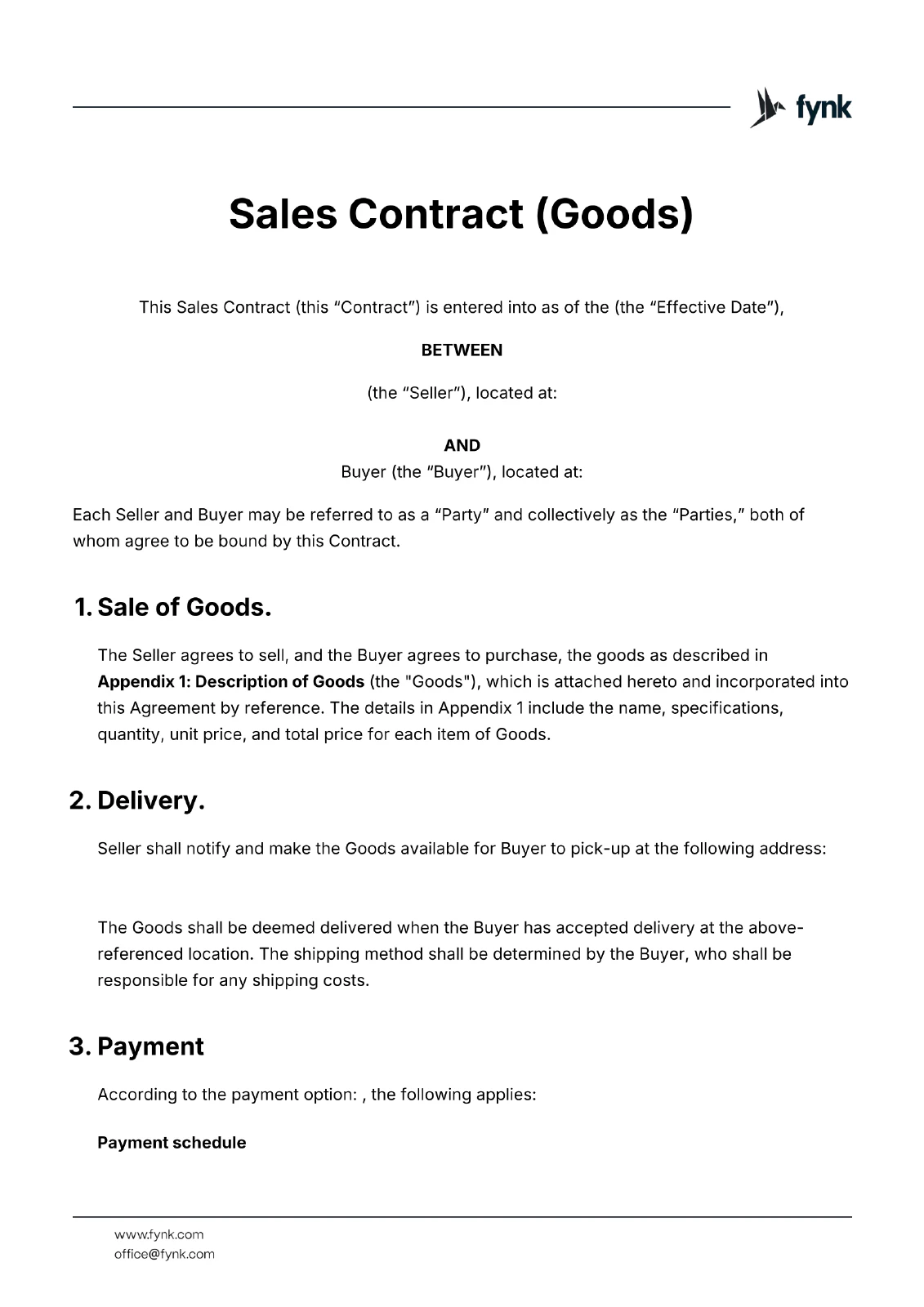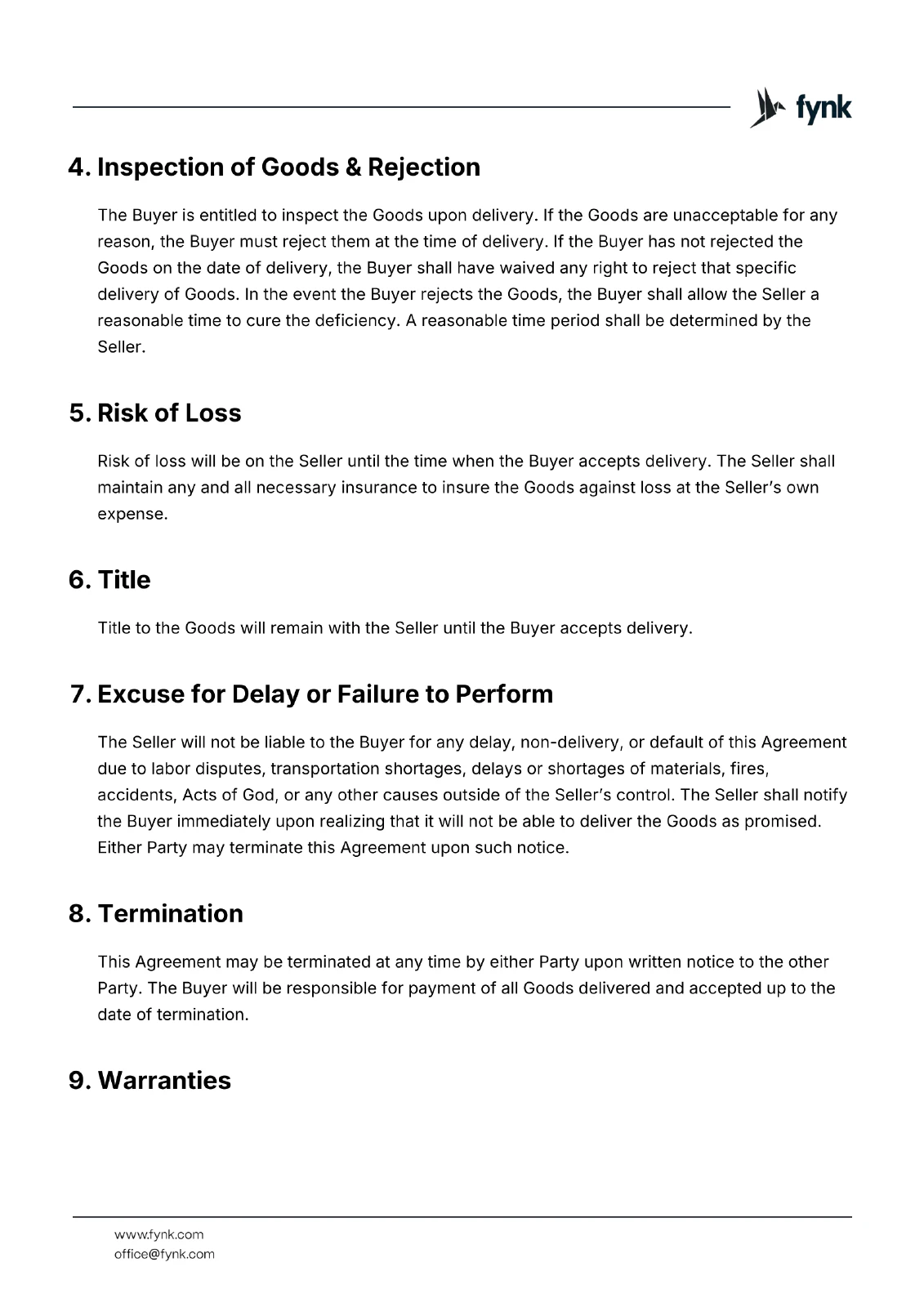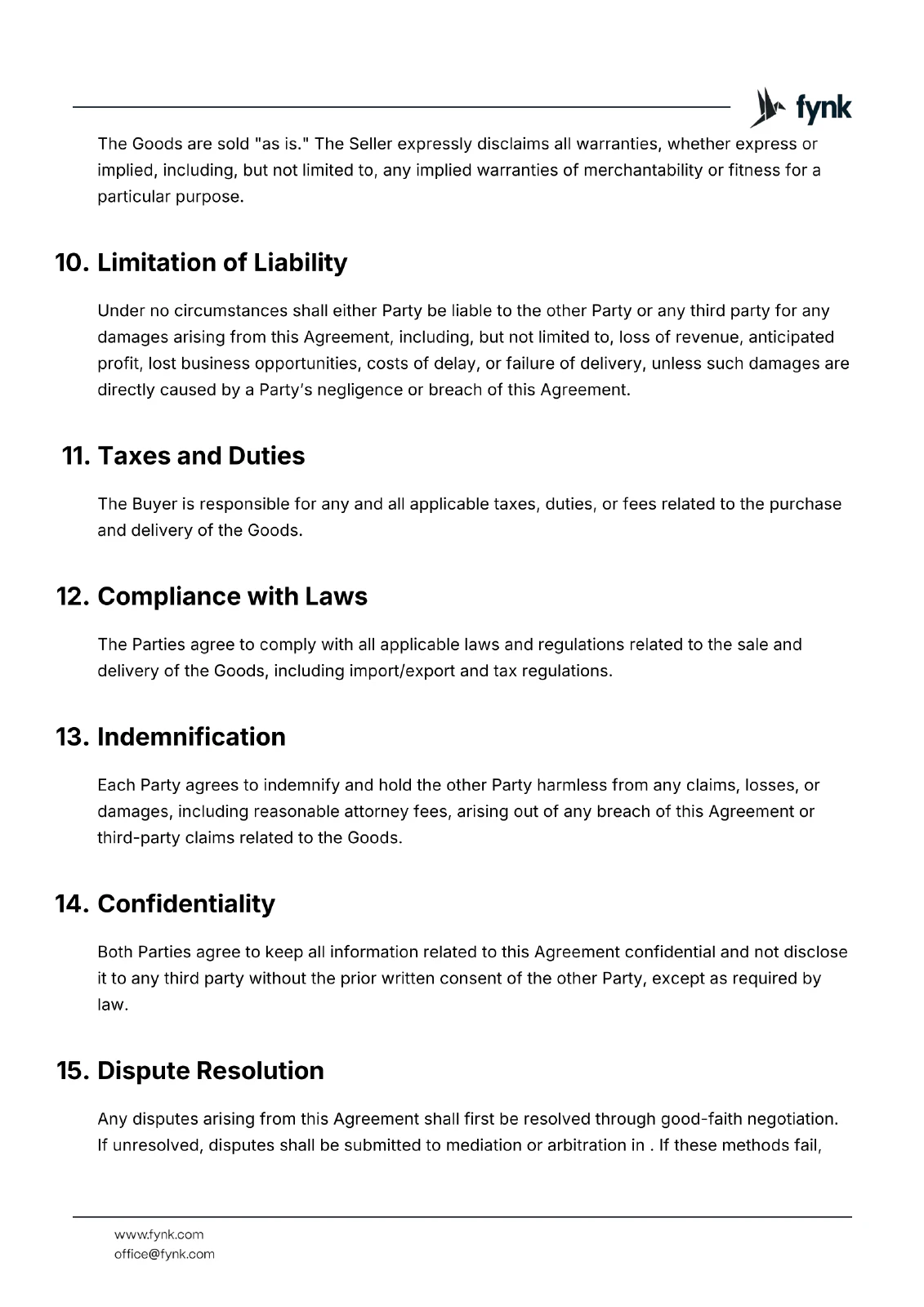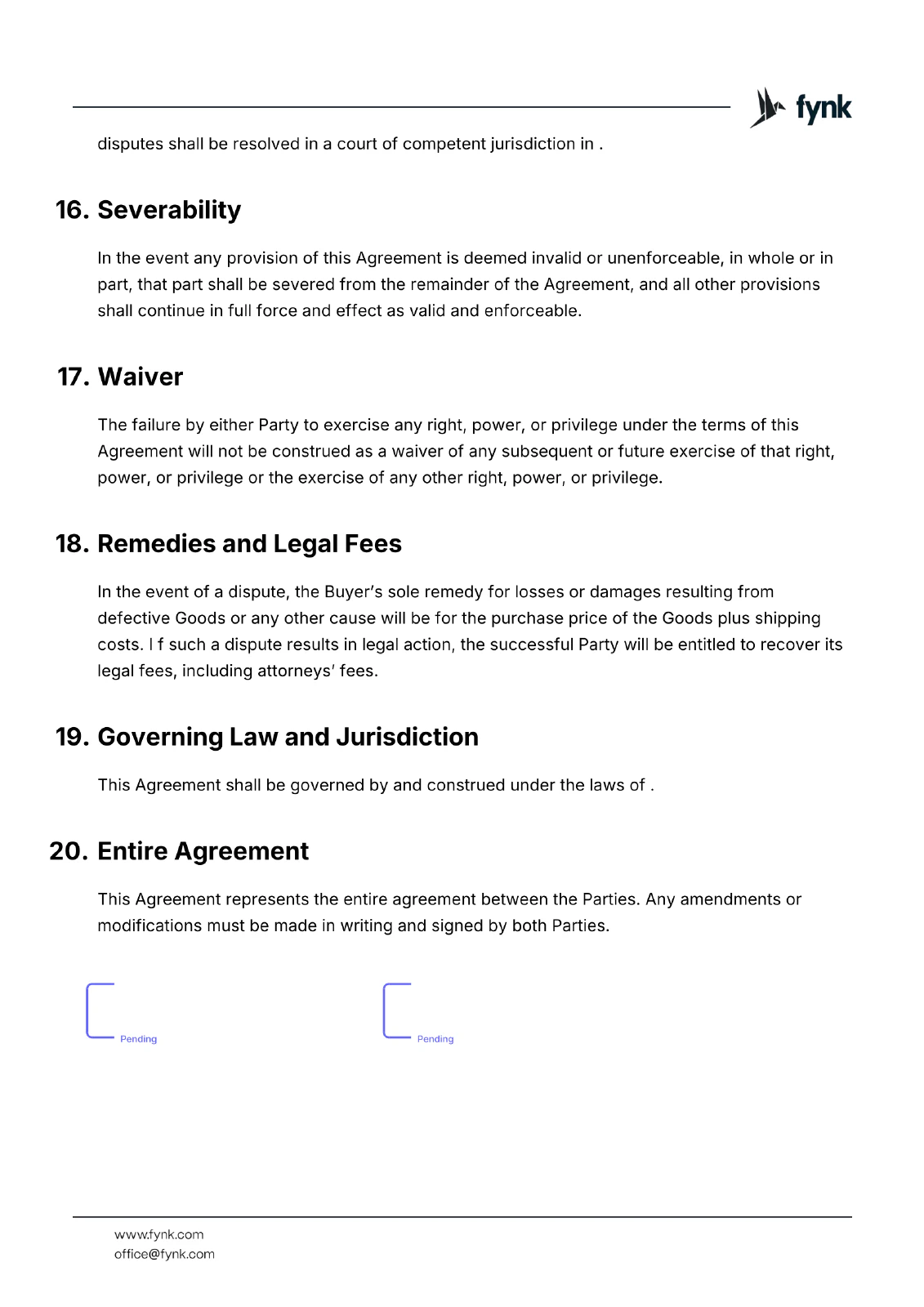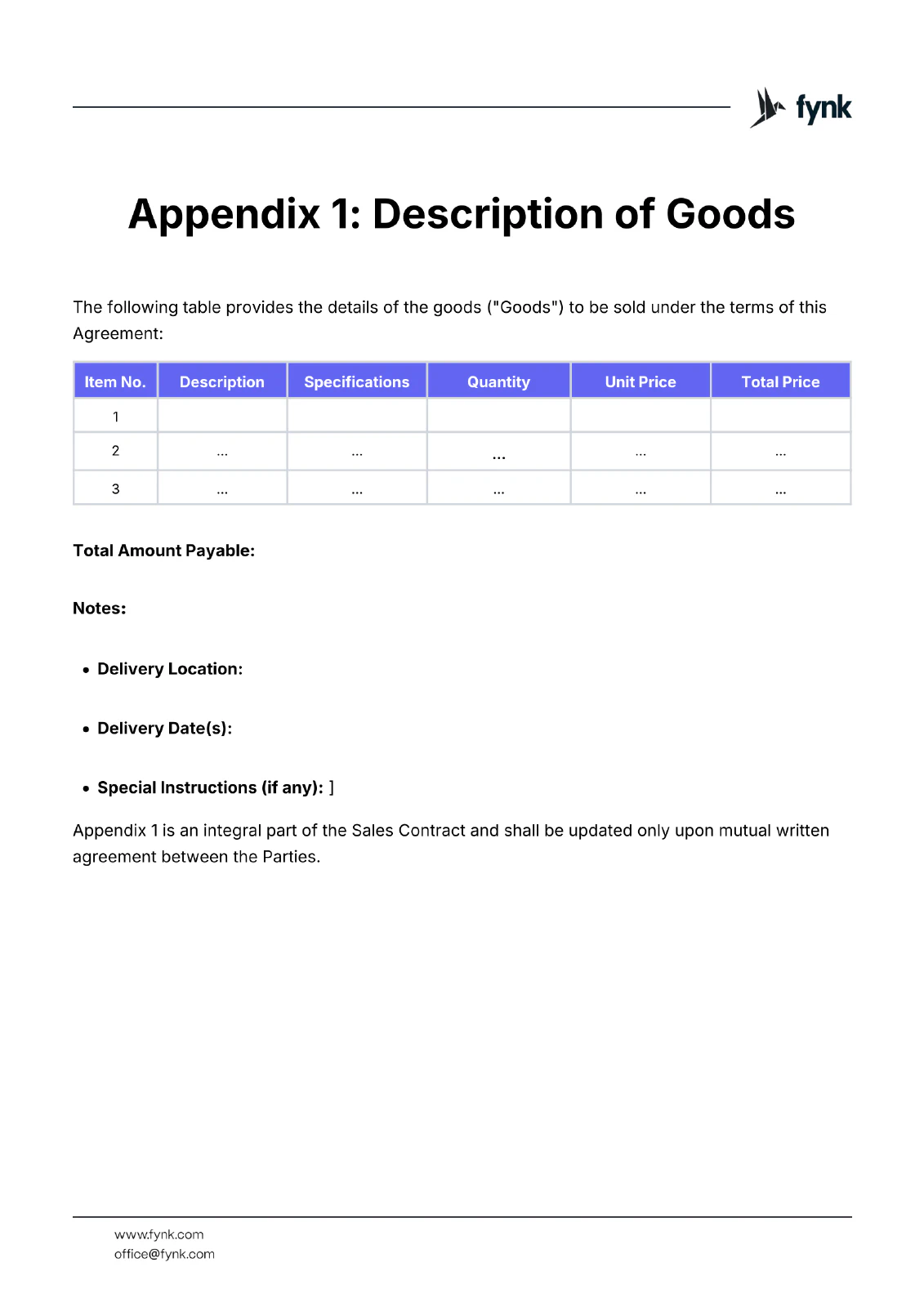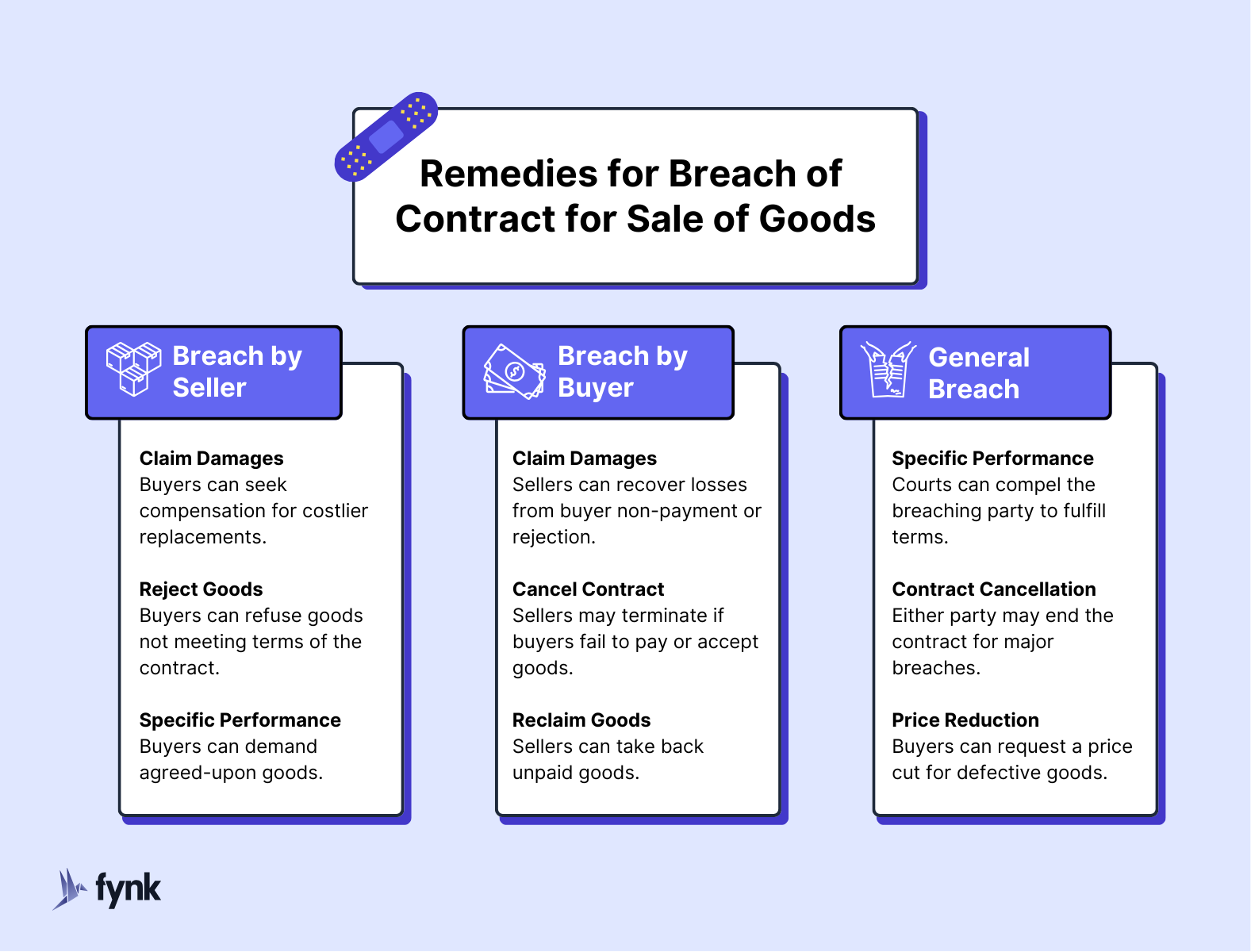Sales Contract (Goods)
This Sales Contract (this “Contract”) is entered into as of the (the “Effective Date”),
BETWEEN
(the “Seller”), located at:
AND
Buyer (the “Buyer”), located at:
Each Seller and Buyer may be referred to as a “Party” and collectively as the “Parties,” both of whom agree to be bound by this Contract.
Sale of Goods.
The Seller agrees to sell, and the Buyer agrees to purchase, the goods as described in Appendix 1: Description of Goods (the "Goods"), which is attached hereto and incorporated into this Agreement by reference. The details in Appendix 1 include the name, specifications, quantity, unit price, and total price for each item of Goods.
Delivery.
Seller shall notify and make the Goods available for Buyer to pick-up at the following address:
The Goods shall be deemed delivered when the Buyer has accepted delivery at the above-referenced location. The shipping method shall be determined by the Buyer, who shall be responsible for any shipping costs.
Payment
According to the payment option: , the following applies:
Payment schedule
Inspection of Goods & Rejection
The Buyer is entitled to inspect the Goods upon delivery. If the Goods are unacceptable for any reason, the Buyer must reject them at the time of delivery. If the Buyer has not rejected the Goods on the date of delivery, the Buyer shall have waived any right to reject that specific delivery of Goods. In the event the Buyer rejects the Goods, the Buyer shall allow the Seller a reasonable time to cure the deficiency. A reasonable time period shall be determined by the Seller.
Risk of Loss
Risk of loss will be on the Seller until the time when the Buyer accepts delivery. The Seller shall maintain any and all necessary insurance to insure the Goods against loss at the Seller’s own expense.
Title
Title to the Goods will remain with the Seller until the Buyer accepts delivery.
Excuse for Delay or Failure to Perform
The Seller will not be liable to the Buyer for any delay, non-delivery, or default of this Agreement due to labor disputes, transportation shortages, delays or shortages of materials, fires, accidents, Acts of God, or any other causes outside of the Seller’s control. The Seller shall notify the Buyer immediately upon realizing that it will not be able to deliver the Goods as promised. Either Party may terminate this Agreement upon such notice.
Termination
This Agreement may be terminated at any time by either Party upon written notice to the other Party. The Buyer will be responsible for payment of all Goods delivered and accepted up to the date of termination.
Warranties
The Goods are sold "as is." The Seller expressly disclaims all warranties, whether express or implied, including, but not limited to, any implied warranties of merchantability or fitness for a particular purpose.
Limitation of Liability
Under no circumstances shall either Party be liable to the other Party or any third party for any damages arising from this Agreement, including, but not limited to, loss of revenue, anticipated profit, lost business opportunities, costs of delay, or failure of delivery, unless such damages are directly caused by a Party’s negligence or breach of this Agreement.
Taxes and Duties
The Buyer is responsible for any and all applicable taxes, duties, or fees related to the purchase and delivery of the Goods.
Compliance with Laws
The Parties agree to comply with all applicable laws and regulations related to the sale and delivery of the Goods, including import/export and tax regulations.
Indemnification
Each Party agrees to indemnify and hold the other Party harmless from any claims, losses, or damages, including reasonable attorney fees, arising out of any breach of this Agreement or third-party claims related to the Goods.
Confidentiality
Both Parties agree to keep all information related to this Agreement confidential and not disclose it to any third party without the prior written consent of the other Party, except as required by law.
Dispute Resolution
Any disputes arising from this Agreement shall first be resolved through good-faith negotiation. If unresolved, disputes shall be submitted to mediation or arbitration in . If these methods fail, disputes shall be resolved in a court of competent jurisdiction in .
Severability
In the event any provision of this Agreement is deemed invalid or unenforceable, in whole or in part, that part shall be severed from the remainder of the Agreement, and all other provisions shall continue in full force and effect as valid and enforceable.
Waiver
The failure by either Party to exercise any right, power, or privilege under the terms of this Agreement will not be construed as a waiver of any subsequent or future exercise of that right, power, or privilege or the exercise of any other right, power, or privilege.
Remedies and Legal Fees
In the event of a dispute, the Buyer’s sole remedy for losses or damages resulting from defective Goods or any other cause will be for the purchase price of the Goods plus shipping costs. I f such a dispute results in legal action, the successful Party will be entitled to recover its legal fees, including attorneys’ fees.
Governing Law and Jurisdiction
This Agreement shall be governed by and construed under the laws of .
Entire Agreement
This Agreement represents the entire agreement between the Parties. Any amendments or modifications must be made in writing and signed by both Parties.
Appendix 1: Description of Goods
The following table provides the details of the goods ("Goods") to be sold under the terms of this Agreement:
Item No. | Description | Specifications | Quantity | Unit Price | Total Price |
|---|---|---|---|---|---|
1 | |||||
2 | … | … | … | … | … |
3 | … | … | … | … | … |
Total Amount Payable:
Notes:
Delivery Location:
Delivery Date(s):
Special Instructions (if any): ]
Appendix 1 is an integral part of the Sales Contract and shall be updated only upon mutual written agreement between the Parties.

